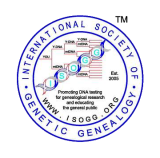Native American Tribes and DNA Policies
From ISOGG Wiki
Contents
History
While different types of DNA can reveal Native American origins, DNA testing cannot reveal what tribe a person is from as a tribe is a social construct. When individuals have matches to people in tribes, this means that the person has a genetic cousin in the tribe, but does not necessarily mean the person is from that tribe. Some Native American tribes have utilized DNA results in conjunction with other records to enroll, and in some cases, disenroll tribal members.
Cherokee
The Cherokee Freedmen Controversy was a political and tribal dispute between the Cherokee Nation of Oklahoma and descendants of the Cherokee Freedmen regarding the issue of tribal membership. The controversy had resulted in several legal proceedings between the two parties from the late 20th century to August 2017. At the 2004 conference of the Descendants of the Freedmen of the Five Civilized Tribes, members participated in DNA testing offered by Rick Kittles of African Ancestry.[1]
Pee Dee River Indian Tribe
First member accepted to a Pee Dee Indian tribe using a Genographic Project DNA test combined with genealogical documentation.[2]
Picayune Rancheria of Chukchansi Indians
The Picayune Rancheria of Chukchansi Indians used DNA testing to disenroll members [3] but the types of tests were not cited in the media articles.
Disenrollment controversy
Since the 2003 opening of the Chukchansi Gold Resort and Casino the Chukchansi Tribe has been one of the leading tribes known for disenrolling its own members. Disenrollment is the process by which a tribe strips members of their tribal affiliation thus denying those members the benefits associated with federal tribal affiliation such as education benefits, land and property rights on reservations, tax benefits, medical benefits, and payments to the tribe from tribal sources of money including money from casinos owned by the tribe as well as child care and elder care.[4][5] Since 2003 hundreds of tribal members have been disenrolled allowing the remaining tribal members to receive larger portions of the income from the casino. The tribe has disenrolled people with documented ancestry, land rights granted by the federal government and some of the last native speakers of the Chukchansi language. By 2013 the tribal membership had gone from an estimated 1800 members to an estimated 900 members. In a now thrown-out court case in 2012, the Ramirezes family argued that only the members of their family were legitimate Chukchansi tribe members.[6] In February 2012 leaders who opposed the policies of disenrollment were elected to the tribal council by a majority vote. However, the incumbent council members invalidated the elections and refused to step down to the newly elected leaders. This resulted in supporters of the newly elected leaders staging protest where they occupied the “City Hall” building. The supporters of the incumbents then showed up and began throwing pepper-spray and burning logs into the building the protesters were occupying. Sheriffs deputies from Fresno and Madera Counties as well as the California Highway Patrol were called to break up the resulting riots.[7]
In February 2014 the Bureau of Indian Affairs stepped in and reappointed the 2010 Tribal Council in an attempt to temporarily resolve the dispute until a new Tribal Council was voted on. They decided to reappoint the 2010 leadership as that was the last year when the BIA could determine that there was an uncontested Tribal Council election.[8] In October 2017, the Chukchansi Tribe announced open enrollment but did not specify whether previously disenrolled members would be allowed to re-enroll.[9]
References
- ↑ Koerner BI. Blood feud. Wired, 1 September 2005.
- ↑ Borges K. [1] ISOGG newsletter, Vol. 1 No. 1 March 2008.
- ↑ Ellis J and Benjamin M. Chukchansi casino brings cash and turmoil to once impoverished tribe. The Modesto Bee, 18 October 2014.
- ↑ Tribes Transcript from This American Life on NPR.
- ↑ Rayburn J. ‘’Chukchansi dispute Rreviewed. The Collegian, 4 March 2013.
- ↑ Stand up for California (registration required).
- ↑ Stand up for California (registration required).
- ↑ Chuckchansi Tribal Council. Fresno Bee (broken URL)
- ↑ Fresno Bee article Fresno Bee (broken URL)
